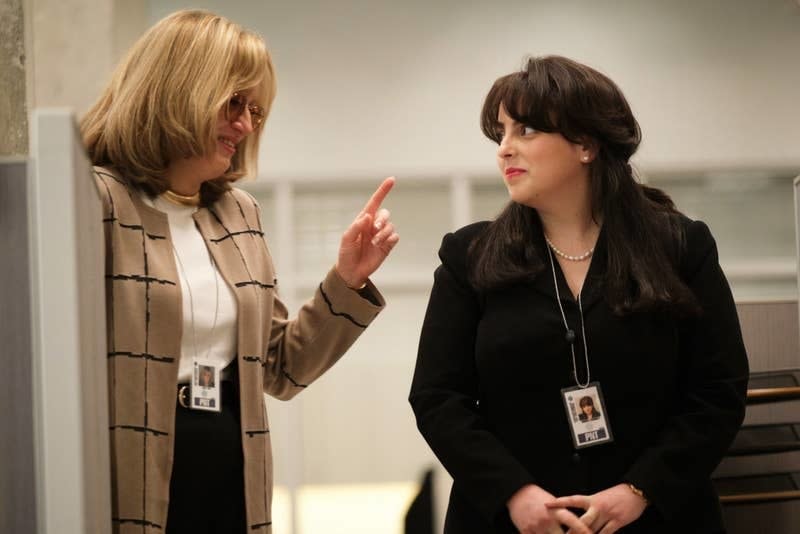“Impeachment: American Crime Story” Was Meant To Do Right By The Women Whose Story It’s Telling — Here’s How It Failed
- Oops!Something went wrong.Please try again later.
- Oops!Something went wrong.Please try again later.
On today's episode of BuzzFeed Daily, we broke down the top pop culture headlines AND discussed Impeachment: American Crime Story. You can listen below or scroll down to read more about the interview!
Listen on the iHeartRadio app, Apple Podcasts, Spotify, or Google Podcasts. You can also find BuzzFeed Daily wherever else you might listen to your favorite podcasts!
So let's dive right into it! Recently we talked to film and culture critic Cate Young about Impeachment: American Crime Story and how it fails the women involved in the Clinton-Lewinsky scandal. Here's some of what we learned:

BuzzFeed Daily: Right now, only three episodes of impeachment have aired, but you've watched the first seven. Without going into too much detail, can you give us an overall impression of what you've seen so far?
Cate Young: Based on what I've seen — and what I had put into my Bitch Media review — is that the show doesn't really seem to care for these women, which is interesting to me because it is billed as a retelling of the story from their perspective. It's frustrating and interesting to me to recognize that they have essentially taken the most cynical approach to retelling the story. Which is to cast these women — yes, as players in the story — but also as ambitious women who are working toward their own gain without any real sense of moral clarity. And to me, that is simply just not the correct take.

BuzzFeed Daily: It definitely seems safe to say that Linda Tripp is one of the show's main villains. Do you think this is fair to the real Linda Tripp, especially considering she passed away in 2020 and is unable to give any feedback or defend herself?
Cate Young: I don't know that "fair" is the right word to use in this particular circumstance, only because I think that the actions that are depicted of hers in this show are accurate. I think when it comes to the matter of what she did, where the show goes off track a bit is by twisting the spirit of what she did to fit a tidier narrative. The truth is simply that it was a messy decision that she made and it had difficult consequences for the people involved. And she was not a perfect whistleblower. She was not a perfect person. Her animosity towards the Clintons was well documented. But it doesn't change the fact that she was right about the nature of this relationship. She was right that it needed to be reported. She was right that Lewinsky was being taken advantage of by a powerful man who did not care for her or care about her and would not have looked out for her. But the issue that I have with this show is that it twists her genuine motives into her less flattering ones — and uses the less flattering ones as evidence against the genuine ones. And to me, that's frustrating because it attempts to shape the story in a very clear-cut black and white way, when the truth of the matter is simply that she did the right thing in the wrong way and harmed a lot of people. But it doesn't mean that her actions were inherently bad. If it were me, I would have taken the time to convince Monica to come forward on her own. But it doesn't change the fact that eventually this did need to come out. And if she had been able to give Monica more agency in that decision, things may not have been as bad as they were.
BuzzFeed Daily: In your piece, you talk about how Sarah Paulson's performance really cements Linda Tripp's villain status. As you pointed out, Sarah defended her decision to wear a fat suit and prosthetics, saying she felt she was "right for the part." Do you think this sort of negative portrayal was intentional, or did she really try to do the role justice and just missed the mark?
Cate Young: I don't think that the negative portrayal was intentional. I think that she feels that the portrayal that we got was the truth of the character. She feels as though she neutrally approached Linda Tripp and her legacy — and that if it happened to fall negatively, then that is simply the truth of the story. I disagree, but I also think that it is understandable that she would, in digging through the motivations of the story — presumably without access to Linda herself, because I believe she died during production of the show — that is where she would come to. And that has been the predominant narrative about Linda Tripp for the last two decades. The show makes no secret of her less flattering qualities. She was quite a presence and did not make herself available or friendly to many people. And I think that that fact is taken as an indication of her moral persuasion in a way that is perhaps not quite as encompassing of her as a person as we would like to pretend it was. And the nature of television is that we pick and choose the details that we present in order to give an audience a tidy narrative. And I think that the tidiest narrative here is that Linda Tripp was a villain. It's just not the right one.

